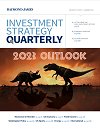Currently, a simple yield curve model puts the odds of entering a recession within the next 12 months at about 40%.
To read the full article from Chief Economist Scott Brown, see the Investment Strategy Quarterly publication linked below.
The normal state of an economy is expansion – that is, growing. A recession begins when the economy stops growing (and begins contracting) and ends when the economy starts growing again.
Can a recession be forecasted? We have only had 11 recessions since World War II (and just three in the past 37 years). That’s a very small sample size. The economy has evolved in significant ways over time. So, past experience may not tell us much.
There are few signs that the overall economy is currently in a recession. The household sector fundamentals (job gains and wage growth) have remained strong, and consumer spending (68% of GDP) should provide support for overall economic growth in the near term. While we don’t see the kind of excesses that would lead to a more pronounced economic downturn, the tools for fighting a recession are likely to be constrained. Investors should consider that while recessions are transitory phenomena and the prospects for longer-term expansion remain good, demographic changes will have a dominant impact on the economy in the decades ahead.
Key Takeaways
- We are never “due” for a recession. However, recessions are inevitable.
- The yield curve has historically been the single best predictor of recessions. It may be a year or more between yield curve inversion and the start of a recession.
- There are few signs the overall economy is currently in a recession. Job gains and wage growth have remained strong, and consumer spending should provide support for overall economic growth in the near term.
- Should the U.S. reach a trade agreement with China, uncertainty would decrease and that may help avoid a recession in 2020. However, if the trade war continues to escalate, the downside risks to the economy will increase.
- While recessions are transitory phenomena and the prospects for longer-term expansion remain good, demographic changes will have a dominant impact on the economy in the decades ahead.

Read the full October 2019
Investment Strategy Quarterly
All expressions of opinion reflect the judgement of Raymond James & Associates, Inc., and are subject to change. Investing in international securities involves additional risks such as currency fluctuations, differing financial accounting standards, and possible political and economic instability. These risks are greater in emerging markets.











